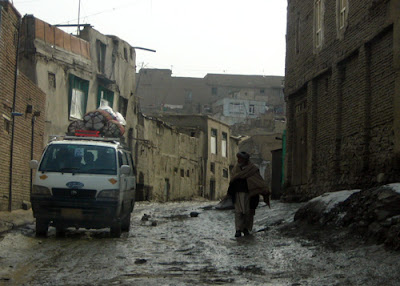Winter has its impact on everything: not just on the skin of my hands, or the water in the pipes. It also has a huge impact on transport, by road and by air. Many locations are completely cut off by road, and flights are more likely not to materialize than to materialize these days. Despite this gloomy outlook, I decided to test my luck to set off for Hirat today. Frankly to say, I haven't been all that lucky lately, and I thus wouldn't have been surprised if winter magic would have cut my plans to visit Hirat short.
With or without bad weather, each flight is a unique experience in places like Afghanistan or Somaliland. Already I have written plenty of stories on my experiences with lofty planes (roughly a year ago, a plane I flew with lost its door), with russian planes (old Antanovs are not at all a rarity in Somaliland), and with planes that can't take off because their batteries are empty (it's not only cars whose batteries are empty after a night with lights on). The good thing is that flying just never gets boring in places like these. There is always something new to discover, sometimes for the better, sometimes for the worse. You think you know your airline, and then, all of a sudden, your completely thrown off. Forget about reliability and "we bring you home" advertisements...
Today, in good hope and mood, I left my house at five forty five am. Bad news dropped down from the sky in form of innocent white cristalls. While sliding on slippery roads with our old Toyota towards airport, Said Rahman, our driver, kept on shaking his head and wispering "Johanna not going to Hirat today - snow no good for planes!" And he was right. All what welcomed us at the airport was a checkpoint guard outside the airport, telling us to turn back and go home again, no plane. The airport behind him was peacefully covered with snow.
Two hours later I learned that the plane was indeed going to take off, not at seven as indicated on the ticket, but at noon. As told, I went to the airport again at ten, this time I wasn't stopped by the guard at the main gate, but by guards just across the square in front of the airport building. A patient crowd of male Afghans, all dressed in the typical kamiz, wide trousers with a knee long short, and a brown shawel wrapped over their hair and face, covering to some extend the long beards, was already gathering there. An ordinary American might take a crowd like this for a suicide squad... Together we waited for another hour, in the cold, until we were told at eleven thirty that now, Kam air is ready to check in. So on we went, to the main building of the airport, paying our airport fee, handing over our luggage, getting checked ourselves, and finally moving on to terminal one, which is really just a room with a tiny Kiosk that sells nuts and raisins by kg and otherwise pringles and snickers. To my surprise I witnessed that the water for the hot coffee was taken out of the tab from the male toilet, but it actually tasted ok. On the electronic info board above the kiosk it said that the flight would take off at 12:30. At 12:15 the board said "boarding", but nobody moved. For ten minutes it blinked red, before it finally changed to "departed". Anxiously looking around the room, I realized that it was just me and another non Afghan who got nervous. All the rest leaned back and enjoyed nuts and coffee from the tiny Kiosk. As it turned out, it was a mistake from the computer, and at one o clock we were finally asked to board the plane. As boarding was nearly complete, a group of men run towards the plane, rushed into it, as I learned later, it was the governor of Western region, and his entourage.
Finally, we took off, climbing our way up through snow, wind and smog. Not much later, the sky cleared up and I could get a glimpse of the remoteness of Afghan rural life. As far as I could see, snow covered mountain ranges lay like an angry sea below us. In between, tiny villages, and one just wonders how people survive in this "middle of nowhere" places.
The rest of the flight was unspectacular, only getting my luggage was a bit rough. Cutting things short, the luggage was simply carried outside the airport in one of these airport waggons, and everybody started digging and grabbing for his bags. In all this caos I managed to secure my bag and move on to my office, where I spend the rest of the day talking to our field coordinator about programs in Western region.
In the next post, some pics from the Afghan winter...
 Kids next to Darulaman, the palace build at the beginning of of the nineteenth century by King Shah Amanullah Khan. It's all destroyed by now, with ruins turned into a perfect playground for kids from the nearby squatters
Kids next to Darulaman, the palace build at the beginning of of the nineteenth century by King Shah Amanullah Khan. It's all destroyed by now, with ruins turned into a perfect playground for kids from the nearby squatters Riders on the way Buz-kashi, the national sport of Afghanistan. Its basically throwing a killed goat over a football sized field, until one team manages to get it into the goal. Just like foot ball.
Riders on the way Buz-kashi, the national sport of Afghanistan. Its basically throwing a killed goat over a football sized field, until one team manages to get it into the goal. Just like foot ball.
 Here they come: competitors in the buz kashi
Here they come: competitors in the buz kashi






















